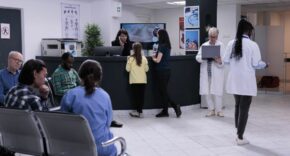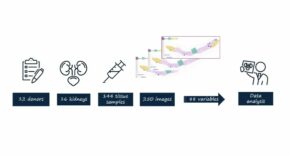
Devon based Brain in Hand scoops prestigious SBRI Healthcare Award to improve self-directed support services for thousands of Autistic People in UK
UK digital healthcare company, Brain in Hand, has won a prestigious Small Business Research Initiative (SBRI) Healthcare award. Funded by NHS England & NHS Improvement, the £800,000 award is a recognition of Brain in Hand’s revolutionary digital self-management approach to support services for autistic people, both pre- and post-diagnosis.
The award also signals confidence in Brain in Hand as an effective solution in meeting the critical needs in autism services, supporting the NHS Long Term plan and health and social care strategy.
Brain in Hand aims to transform the model of care for autistic people by championing user-led self-management. Following a first-phase feasibility fund awarded in 2019, this phase two funding will help to increase access to its combined digital and human based self-directed support services. It will allow Brain in Hand to continue to advance the product’s capabilities, enhancing functionality, usability, and the overall experience to users and service providers, improving daily management and providing greater independence. It will also fund clinical and health economic impact research enabling Brain in Hand to demonstrate the system’s effectiveness in meeting needs in autism services.
The unmet needs
Autism costs the UK £32bn a year, more than cancer, heart disease and stroke combined, yet 71% of autistic adults are not getting the support they require. With over 700,000 autistic people in the UK and 9-month waiting lists, there could be over 30,000 new referrals for diagnosis in the first three quarters in 2021 alone. It is essential to improve the effectiveness of existing services and provide integrated and accessible solutions for those who are pre- and post-diagnosis.
The COVID-19 pandemic has further exacerbated the unmet needs, having a negative impact on the ability to access support services, leaving many stranded or relying on families for support. Services like Brain in Hand can play an important role in the health and social care pathways, providing access to services on the users’ terms, especially at a time when physical resources are dramatically restricted.
Dr Louise Morpeth, CEO of Brain in Hand states, “We are over the moon to be SBRI grantees and to have the opportunity to demonstrate the value of our system for autistic people. We are grateful to our partners for joining us on this exciting project, and especially pleased to be waving the flag for the south west! The pandemic has shown that it is time to embrace the potential of technology to support those who are so often excluded or overlooked. We look forward to seeing digital health solutions take their proper place in the continuum of care.”
Co-creation with Brain in Hand users
The company works closely with its user community and product evolution is a direct response to first-hand user experience, the SBRI award will be used to further advance the product’s capabilities and test it with 100 autistic adults. This will not only directly help improve the lives of those who participate, but their feedback will ensure that changes are made to benefit more users in the future and improve their independence.
Connor Ward, autistic advocate and influencer, and independent advisor to Brain in Hand for the SBRI application, explains, “I wanted to support Brain in Hand as it has huge potential. With this funding it will become a proactive customisable support system that people will be able to access from the start, when they need it. Technology has played a massive part in offering autistic people greater independence and Brain in Hand’s unique and personalised approach will help users in their moments of stress and uncertainty. The autism spectrum is so wide that no one tool will be able to help everyone, however this service will develop and grow with each user, which is truly revolutionary.”
Collaborating with service providers
Brain in Hand has strong evidence of effectively supporting autistic people. Results from the 2019 Charity for Civil Servants evaluation report showed 9 out of 10 users reported an increase in wellbeing within 7 months. Brain in Hand has also proven cost efficiencies for service providers, with an average direct cost saving of £2,800 per user.
Dr Louise Morpeth explains, “We believe our system is unique. No-one else provides a 24/7 dedicated digital support system for autistic people. The benefits of Brain in Hand have been demonstrated through partnerships with local authorities and social care providers, including national charities. Operating in 25% of local authorities including Devon, Kirklees, Knowsley and Hampshire, we are no longer a novelty. Rather, we are becoming part of business as usual in numerous settings. We pride ourselves on the high-quality support we provide for each new site – we ensure smooth implementation and make sure the right people get the right support and, importantly, we reduce burden on existing services.”
As part of the award, Brain in Hand is working with Dr Rohit Shankar MBE, who will lead the study with the Cornwall Partnership NHS Foundation Trust and University of Exeter into the system’s functionality, testing the second-generation version with 100 autistic UK adults.
Dr Rohit Shankar MBE, FRCPsych, Consultant in Adult Developmental Neuropsychiatry (CFT) and Hon. Associate Clinical Professor, University of Exeter Medical School, says, “We owe autistic people necessary tools and support to ensure they gain and maintain independence and to improve their quality of life in the challenging world we live in. The financial costs and lack of resource to support autistic people are significant and interventions that will aim to reduce this is extremely valuable. I believe that Brain in Hand is a potential solution. I am extremely pleased to be involved in leading the assessments and further development of the product, its technology and testing implementation into the wider society and NHS over the next 12 months.”
Dr Shankar continues, “We face many challenges with mental health services in the NHS and must provide different types of access and support, especially now during the COVID-19 pandemic, where services are reduced and access is limited, compounding the difficulties that these individuals face. Autistic people due to their neurodiversity have higher incidence and prevalence of mental health concerns. Therefore, there is even more urgency to provide an effective, technologically advanced and cost-effective solution that can be quickly implemented, like Brain in Hand.”













